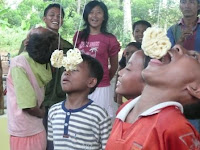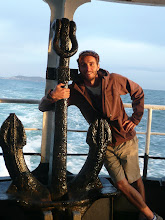The following are a few reflections on sickness and death that have been brought to my attention in various ways over the past 2 months.
Death is a reality that we often try to avoid at all costs. New medical advances can now prolong peoples' lives in ways undreamed of only centuries ago. Talking about death is also something we take elaborate measures to minimise. Funeral services are kept discreet and away from the general public. Our language also emphasisies this tendency as we choose to use euphemisms like 'passed away' and 'gone to rest'. Death is taboo. Can we extend the phrase coined by Friedrich Nietzsche "God is dead!" and claim also that Death, too, is dead?
This is not the case in my experience in Manado. Death is a reality that is seen, felt, and experienced regularly. Not a week has gone by where I have not seen a funeral. There are no private and discreet funeral services here, most families have the service at their home. No matter where they live, the road is blocked off temporarily. The cultural norm of Minahasa (Region of North Sulawesi of which Manado is the largest city) is to publicly mourn on the night of one's death, and also on the 3rd and 40th night.
Death is also a reality I have seen, felt and experienced at home. In the past two weeks, two of our patients died, both of cancer. One was a middle aged man leaving his wife, and the other a 5 year old girl leaving her young parents. This has affected me in a way I'm not yet able to articulate. One thing I can say is how aware I am of how everyone else continues life as if nothing has happened. I'm not yet sure to call this remarkable resilience or a hard-willed resistance to allow emotions get the best of them. I do not have photos of these two wonderful people, only memories. Their tumas were so visibly grotesque I chose not to take their photo and make them feel like specimens.
The presence of death is a healthy reminder to us of our shared fates, and the brevity of life. I hope this post might offer a sobering point of reflection for you, and doesn't leave you morbid and depressed. I choose not to remain in that state. Instead, I will reflect on the profound words of John Donne who lived in the presence of death in the 16th Century. Each day people were dying from the bubonic plague. John himself was diagnosed and thought terminally ill for years before realising an incorrect diagnosis. It was in this state he was able to write these words:
DEATH be not proud, though some have called thee
Mighty and dreadfull, for, thou art not so,
For, those, whom thou think'st, thou dost overthrow,
Die not, poore death, nor yet canst thou kill me.
From rest and sleepe, which but thy pictures bee,
Much pleasure, then from thee, much more must flow,
And soonest our best men with thee doe goe,
Rest of their bones, and soules deliverie.
Thou art slave to Fate, Chance, kings, and desperate men,
And dost with poison, war, and sickness dwell,
And poppie, or charms can make us sleepe as well,
And better then thy stroake; why swell'st thou then;
One short sleep past, we wake eternally,
And death shall be no more; death, thou shalt die.
Two weeks ago I contracted typhoid. I have become a patient and been compelled to look at death face to face. Despite this illness affecting most parts of my body, my mind has stayed sufficiently alert to enjoy this time. I am overjoyed to have this opportunity for reading, reflection and prayer. Interestingly the two books I read both spoke to my situation. There was a climactic speech in 'Brave New World' by a savage outsider critical of this new world of youth and propserity in which he declared the right to catch typhoid! Similarly, 'Death of Ivan Ilyich', a short story by Tolstoy traced the slow decline of a man with a pain in his right side. With an enlarged liver, I was able to sympathise with this character! People who have a faith in Jesus have a unique perspective on death. It is that Death, while an imposter on life, is not the end. Death will be the last sting of this life to be triumphed over before entering a life more whole than this one. It is with this wonderful reason for hope that we can look death in the face and say with confidence "Death, you lose!"











.JPG)












